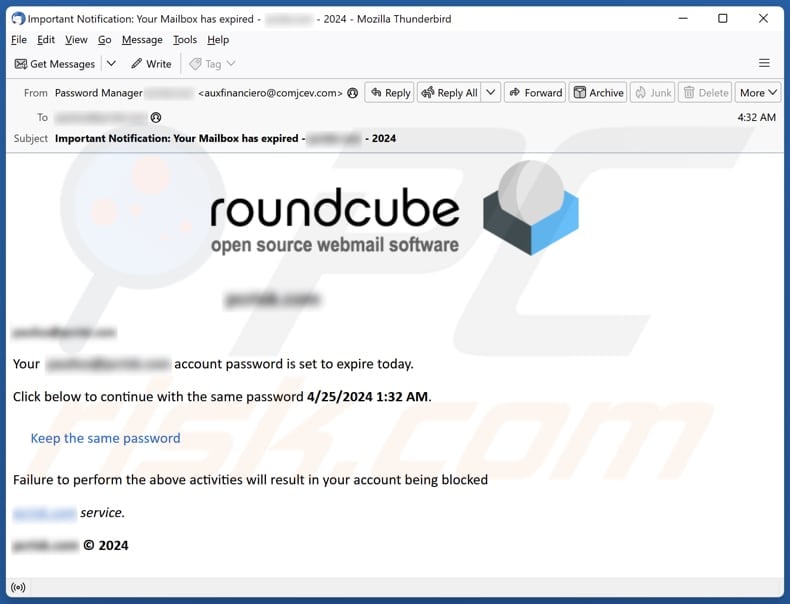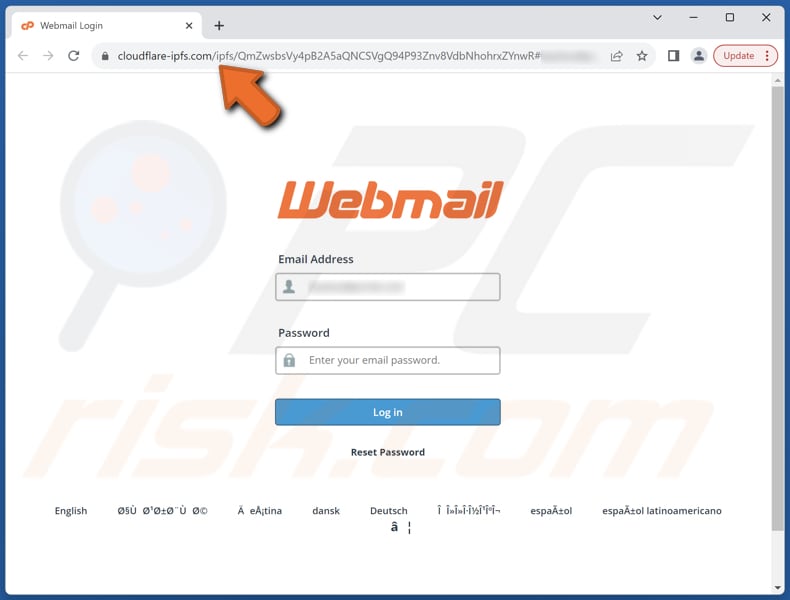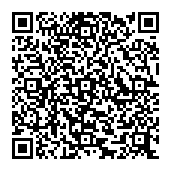How to avoid falling for scams like "Roundcube Password Set To Expire"
![]() Written by Tomas Meskauskas on
Written by Tomas Meskauskas on
What is "Roundcube Password Set To Expire"?
We have scrutinized the email and learned that it is a deceptive message masquerading as a notification from an email service provider. The perpetrators behind this email seek to deceive recipients into believing they need to take specific actions. Their primary objective is to extract personal information. Such emails are commonly known as phishing emails.

More about the "Roundcube Password Set To Expire" scam email
This phishing email purports to be an urgent notification from a webmail service provider. Its subject line suggests that the recipient's mailbox has expired. The email claims to be from "Roundcube," a legitimate open-source webmail software. It prompts the recipient to take action regarding their account password, which is allegedly set to expire on a specific date and time.
The email includes a link for the recipient to click to "continue with the same password". It also warns that failure to comply with the instructions will result in the recipient's account being blocked. The email is designed to create a feeling of urgency and trick the recipient into clicking on the link, ultimately leading to the theft of their personal information.
Clicking the "Keep the same password" link leads to a counterfeit Webmail login page, prompting users to enter their email address and password. It is evident that this phishing website is specifically designed to capture login credentials for email accounts. Once scammers obtain stolen email account login credentials, they can exploit them in various malicious ways.
They may use the compromised email account to send spam or phishing emails to the victim's contacts, further perpetuating their fraudulent activities. Additionally, scammers may access sensitive information within the email account, such as personal details, financial records, or login credentials for other accounts linked to the email address.
Moreover, scammers may attempt to access other accounts that use the same login information, potentially compromising additional sensitive data and exacerbating the impact of the initial breach. Therefore, it is crucial for individuals to remain vigilant and take immediate action to secure their accounts if they suspect unauthorized access or phishing attempts.
| Name | Roundcube Password Set To Expire Email Scam |
| Threat Type | Phishing, Scam, Social Engineering, Fraud |
| Fake Claim | Recipint's mailbox has expired |
| Disguise | Letter from an email service provider |
| Symptoms | Unauthorized online purchases, changed online account passwords, identity theft, illegal access of the computer. |
| Distribution methods | Deceptive emails, rogue online pop-up ads, search engine poisoning techniques, misspelled domains. |
| Damage | Loss of sensitive private information, monetary loss, identity theft. |
| Malware Removal (Windows) | To eliminate possible malware infections, scan your computer with legitimate antivirus software. Our security researchers recommend using Combo Cleaner. |
Similar scam emails in general
Phishing emails typically share common characteristics such as urgent or threatening language, requests for personal information or login credentials, deceptive links or attachments, and attempts to create a sense of urgency or fear to prompt immediate action from the recipient.
Scammers use such emails to extract login credentials, ID card information, credit card details, or other personal information. It is essential to mention that emails of this kind can be used to distribute malware. Examples of phishing campaigns are "Account Protection", "Collaborative Teams", and "Products On LinkedIn".
How do spam campaigns infect computers?
Email attachments serve as common gateways for cyber threats to infiltrate systems. These attachments can be executables, Microsoft Office documents, PDFs, JavaScript files, compressed archives, and other files. When users inadvertently open malicious files or perform actions like enabling malicious macros in infected documents, they unknowingly initiate computer infections.
Furthermore, links embedded within emails can lure users into compromising their systems by directing them to malicious websites. Once on these websites, users may unwittingly trigger drive-by downloads or be deceived into downloading seemingly harmless files containing malware.
How to avoid installation of malware?
When it comes to email attachments and links, exercise caution, especially if they seem unsolicited or irrelevant, particularly from unfamiliar or dubious sources. Keeping your operating system, programs, and security tools up to date is essential.
Always download applications and files from reputable sources, such as official websites and trusted app stores. Be wary of pop-ups, ads, or buttons on suspicious sites, and steer clear of pirated software or cracking tools. Additionally, regularly scan your computer to identify and eliminate any lurking threats.
If you have already opened malicious attachments, we recommend running a scan with Combo Cleaner Antivirus for Windows to automatically eliminate infiltrated malware.
Text presented in the "Roundcube Password Set To Expire" email letter:
Subject: Important Notification: Your Mailbox has expired - ******** - 2024
Roundcube
open source webmail software********
********
- ******** account password is set to expire today.
Click below to continue with the same password 4/25/2024 1:32 AM.
Keep the same passwordFailure to perform the above activities will result in your account being blocked
******** service.
******** © 2024
Phishing website utilized in this scam campaign:

Instant automatic malware removal:
Manual threat removal might be a lengthy and complicated process that requires advanced IT skills. Combo Cleaner is a professional automatic malware removal tool that is recommended to get rid of malware. Download it by clicking the button below:
▼ DOWNLOAD Combo Cleaner
By downloading any software listed on this website you agree to our Privacy Policy and Terms of Use. To use full-featured product, you have to purchase a license for Combo Cleaner. 7 days free trial available. Combo Cleaner is owned and operated by Rcs Lt, the parent company of PCRisk.com read more.
Quick menu:
- What is Roundcube Password Set To Expire phishing campaign?
- Types of malicious emails.
- How to spot a malicious email?
- What to do if you fell for an email scam?
Types of malicious emails:
![]() Phishing Emails
Phishing Emails
Most commonly, cybercriminals use deceptive emails to trick Internet users into giving away their sensitive private information, for example, login information for various online services, email accounts, or online banking information.
Such attacks are called phishing. In a phishing attack, cybercriminals usually send an email message with some popular service logo (for example, Microsoft, DHL, Amazon, Netflix), create urgency (wrong shipping address, expired password, etc.), and place a link which they hope their potential victims will click on.
After clicking the link presented in such email message, victims are redirected to a fake website that looks identical or extremely similar to the original one. Victims are then asked to enter their password, credit card details, or some other information that gets stolen by cybercriminals.
![]() Emails with Malicious Attachments
Emails with Malicious Attachments
Another popular attack vector is email spam with malicious attachments that infect users' computers with malware. Malicious attachments usually carry trojans that are capable of stealing passwords, banking information, and other sensitive information.
In such attacks, cybercriminals' main goal is to trick their potential victims into opening an infected email attachment. To achieve this goal, email messages usually talk about recently received invoices, faxes, or voice messages.
If a potential victim falls for the lure and opens the attachment, their computers get infected, and cybercriminals can collect a lot of sensitive information.
While it's a more complicated method to steal personal information (spam filters and antivirus programs usually detect such attempts), if successful, cybercriminals can get a much wider array of data and can collect information for a long period of time.
![]() Sextortion Emails
Sextortion Emails
This is a type of phishing. In this case, users receive an email claiming that a cybercriminal could access the webcam of the potential victim and has a video recording of one's masturbation.
To get rid of the video, victims are asked to pay a ransom (usually using Bitcoin or another cryptocurrency). Nevertheless, all of these claims are false - users who receive such emails should ignore and delete them.
How to spot a malicious email?
While cyber criminals try to make their lure emails look trustworthy, here are some things that you should look for when trying to spot a phishing email:
- Check the sender's ("from") email address: Hover your mouse over the "from" address and check if it's legitimate. For example, if you received an email from Microsoft, be sure to check if the email address is @microsoft.com and not something suspicious like @m1crosoft.com, @microsfot.com, @account-security-noreply.com, etc.
- Check for generic greetings: If the greeting in the email is "Dear user", "Dear @youremail.com", "Dear valued customer", this should raise suspiciousness. Most commonly, companies call you by your name. Lack of this information could signal a phishing attempt.
- Check the links in the email: Hover your mouse over the link presented in the email, if the link that appears seems suspicious, don't click it. For example, if you received an email from Microsoft and the link in the email shows that it will go to firebasestorage.googleapis.com/v0... you shouldn't trust it. It's best not to click any links in the emails but to visit the company website that sent you the email in the first place.
- Don't blindly trust email attachments: Most commonly, legitimate companies will ask you to log in to their website and to view any documents there; if you received an email with an attachment, it's a good idea to scan it with an antivirus application. Infected email attachments are a common attack vector used by cybercriminals.
To minimise the risk of opening phishing and malicious emails we recommend using Combo Cleaner Antivirus for Windows.
Example of a spam email:

What to do if you fell for an email scam?
- If you clicked on a link in a phishing email and entered your password - be sure to change your password as soon as possible. Usually, cybercriminals collect stolen credentials and then sell them to other groups that use them for malicious purposes. If you change your password in a timely manner, there's a chance that criminals won't have enough time to do any damage.
- If you entered your credit card information - contact your bank as soon as possible and explain the situation. There's a good chance that you will need to cancel your compromised credit card and get a new one.
- If you see any signs of identity theft - you should immediately contact the Federal Trade Commission. This institution will collect information about your situation and create a personal recovery plan.
- If you opened a malicious attachment - your computer is probably infected, you should scan it with a reputable antivirus application. For this purpose, we recommend using Combo Cleaner Antivirus for Windows.
- Help other Internet users - report phishing emails to Anti-Phishing Working Group, FBI’s Internet Crime Complaint Center, National Fraud Information Center and U.S. Department of Justice.
Frequently Asked Questions (FAQ)
Why did I receive this email?
Scammers frequently distribute mass emails, aiming to reach a wide audience without considering whether they have any personal ties to the recipients.
I have provided my personal information when tricked by this email, what should I do?
If you have divulged any account credentials, it is imperative to change all associated passwords promptly to safeguard your accounts against potential misuse. Also, inform your email service provider about the phishing email.
I have downloaded and opened a malicious file attached to an email, is my computer infected?
The likelihood of your computer becoming infected varies depending on the type of file you interact with. Executable files (.exe) or script files (.js, .vbs) contaminated with malware pose a substantial risk when executed, while document or multimedia files generally pose a lower risk of infection.
I have read the email but did not open the attachment, is my computer infected?
Your computer remains uninfected if you have received a suspicious email but refrained from opening any attachments or clicking on any links within it.
Will Combo Cleaner remove malware infections that were present in email attachment?
Combo Cleaner is highly effective in detecting and eliminating almost all known malware. Advanced malware often embeds itself deeply within the system. Therefore, running a full system scan is essential to ensure the eradication of any hidden threats.


▼ Show Discussion